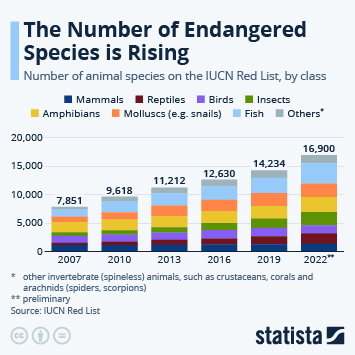The ongoing plight of the world's coral reefs is at a critical stage. The conservation status of the class of organisms, as cited in the latest release of the IUCN Red List, continues to deteriorate. More than half of global reef-building coral species analyzed by the organization were either threatened or "near threatened" in 2022. 3 percent are considered critically endangered, up from just 1 percent in 2018. A further 3 percent are considered endangered, while 24 percent are listed as vulnerable and 21 percent as "near threatened", also slightly up. For 16 percent of the analyzed species, data was insufficient.
The IUCN examined 851 species of reef-building corals for their report, which represents around 15 percent of all species in that group.






















